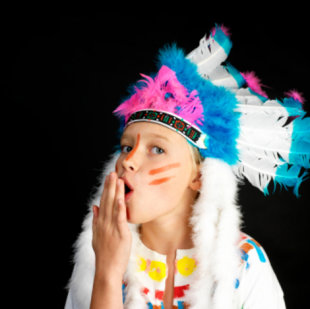Is it Ever Okay for Your Kid to Dress as Another Ethnicity for Halloween?
By Joslyn Gray
My daughter chose to learn about the Lenni Lenape, which is the tribe that originally lived in our area of Pennsylvania. She read books about the Lenape tribes from her school library, and found websites that explained that the Lenape now live all over the United States and Canada, and that many different tribes claim the Lenape as part of their heritage. She researched what traditional Lenape clothing looked like and learned that they used beads and ribbon for decoration, but not feathers like the store-bought costumes showed.
I like to sew, so together we made her a costume as close as we could to the pictures she found. It wasn't a perfect replica; I'm not about to use deerskin to make a Halloween costume. I realize that not every mom has the time or the desire to sew up a well-researched traditional Native American outfit-what about their kids? Are all cultural costumes really so bad?
Consider the words of Noel Altaha on the website Last Real Indians:
"Here is why you should care, whether you are Native or non-Native American. Dressing as someone else's culture has lasting impacts on everyone's psyche," writes Ms. Altaha, who is White Mountain Apache. "Due to European Colonization there has been a collective and continuous loss in Native communities. …So when you wear an 'Indian' or 'Savage' or 'Native American' costume you are basically stereotyping a culture, you are also making their culture a historical reference that sends a message to everyone: Native Americans no longer exist, only in history books and old western films. You are not recognizing the present day Native people who are professors, doctors, actors, and nurses who still identify with their Native culture and are successfully existing in the modern world.
"I do not want to make this all about a race issue because it more than that. This is about respecting oneself through becoming educated and it is about healing for a people who have and continue to suffer from the impacts of historical trauma."
I really do understand what Ms. Atlaha is saying. But I also think that Halloween can be an opportunity for parents to talk to their kids about all kinds of issues: you can talk about what's wrong with the Boys' Phat Pimp costume, for example, or why girls don't need to wear overly grown-up clothes. I used my daughter's Halloween costume to talk about the past and the present of Native Americans. By the time Halloween rolled around, she was telling everyone and anyone about the Walking Purchase, in which William Penn's sons bought/swindled/claimed more than a million acres of Pennsylvania land and forced the Lenape to evacuate.
So Joslyn Gray's position is that if you're well-off and well-educated, with a lot of spare time and the ability to sew, you can make a genuine costume and educate your children. In other words, if you're one in a million Americans--i.e., if you're Joslyn Gray--it's okay to dress your children as Indians.
I don't see much value to asserting the positive case. The negative case is the point here. The vast majority of Americans--virtually everyone--should not dress their kids as Indians. Only if you're willing to do an inordinate amount of work should you even think about it.
Costumes = cultural appropriation
Gray has done everything she could to make the Halloween costume a positive experience. But even with the educational component, I'm not persuaded by her arguments.
For starters, as I said, the costume and the history lesson reinforce the idea of Indians as primitive people of the past. What can the daughter tell us about the present-day circumstances of the Lenni Lenape? Anything?
Also, the whole thing reinforces the idea that cultural appropriation is okay. That an Indian identity is available for the taking. That non-Indians get to decide whether and how they can exploit Indians.
None of this seems okay to me. How about telling the daughter, "No, you can't dress as an Indian. There's no reason you should get something just because you want it.
"If you're interested in Indians, we'll get some books and movies and learn about them. Perhaps we can visit them and buy some of their art and crafts.
"Meanwhile, you can be a ghost or pirate or whatever. You don't need to be an Indian."
For more on Halloween costumes, see University Bans Offensive Halloween Costumes and Native Regrets "Naughty Native" Costume.
Below: Not the author's daughter, I hope.


No comments:
Post a Comment